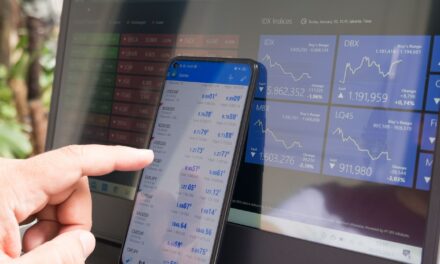
Online Trading: Tips in Selecting the Best Online Trading Platform

Online trading is a great way to invest in the stock market without having to leave the comfort of your own home. With the right online trading platform, you can access the stock market from anywhere in the world and make trades quickly and easily. However, with so many online trading platforms available, it can be difficult to know which one is best for you. In this article, we will provide some tips on how to select the best online trading platform for your needs. We will discuss the features to look for, the fees associated with each platform, and the customer service options available. We will also provide some advice on how to get started with online trading and how to make the most of your investments.
The Basics of Online Trading
Individuals can buy and sell financial instruments such as stocks, bonds, mutual funds, and other securities through an online trading platform. Online trading eliminates the need for a broker or other middleman, making it a convenient and cost-effective way to invest in the financial markets.
To begin, one must open an account with a broker or trading platform and provide personal information, such as their name, address, and Social Security number, and fund their account with a deposit. Once set up, traders can access the trading platform and make decisions on which type of security to buy or sell, how much to invest, and when to buy or sell. After placing an order, traders wait for it to be executed.
Online trading can diversify portfolios and take advantage of market opportunities. However, it is important to research and understand the risks involved and the fees associated with online trading. Overall, online trading is a convenient and cost-effective way to invest in the financial markets if one does their research and understands the risks.
How to Get Started with Online Trading
Online trading is a great way to invest in the stock market and make money. It is a convenient and cost-effective way to buy and sell stocks, bonds, mutual funds, and other securities. With online trading, you can access the stock market from anywhere in the world and make trades in real-time.
If you are new to online trading, here are some tips to get you started:
1. Research: Before you start trading, it is important to do your research. Learn about the different types of investments, the stock market, and the different trading platforms available.
2. Choose a Broker: A broker is a company that facilitates the buying and selling of securities. Make sure to choose a reputable broker with low fees and good customer service.
3. Open an Account: You will need to provide some personal information and fund your account with money.
4. Learn the Platform: Once you have opened an account, you will need to learn how to use the trading platform. Most brokers offer tutorials and other resources to help you get started.
5. Start Trading: Once you are comfortable with the platform, you can start trading. Make sure to start small and only invest money that you can afford to lose.
Online trading can be a great way to make money, but it is important to remember that it is not without risk. Make sure to do your research and understand the risks before you start trading.
Strategies for Successful Online Trading in Volatile Markets
Online trading in volatile markets can be a daunting prospect for many investors. However, with the right strategies and a bit of patience, it is possible to make successful trades in these markets. Here are some strategies to help you succeed in volatile markets:
1. Have a Plan: Before you start trading, it is important to have a plan in place. This plan should include your goals, risk tolerance, and strategies for entering and exiting trades. Having a plan will help you stay focused and disciplined when trading in volatile markets.
2. Monitor the Market: It is important to stay up to date on the latest news and market movements. This will help you identify potential opportunities and make informed decisions.
3. Use Stop Losses: Stop losses are a great way to limit your losses in volatile markets. They are orders that automatically close out your position if the market moves against you.
4. Diversify Your Portfolio: Diversifying your portfolio is a great way to reduce risk in volatile markets. This means investing in different asset classes and sectors to spread out your risk.
5. Use Leverage: Leverage can be a great tool for maximizing returns in volatile markets. However, it is important to use leverage responsibly and understand the risks associated with it.
6. Manage Your Risk: Risk management is key to successful trading in volatile markets. This means setting realistic goals and managing your position size to ensure you don’t overexpose yourself to risk.
By following these strategies, you can increase your chances of success when trading in volatile markets. Remember to stay disciplined and patient, and you will be well on your way to making successful trades.
Is Online Trading Legal?
The jurisdiction in which the trading takes place determines the legality of online trading. The Securities and Exchange Commission (SEC) legally regulates online trading in the United States. Online trading platforms must register with the SEC and follow certain regulations designed to safeguard investors against fraud and guarantee a fair and open trading platform.
The legality of online trading varies in other countries, with some having stricter regulations and others with no regulation at all. Before engaging in online trading, it is crucial to research the laws and regulations of the country in which you are trading.
Understanding the Different Types of Online Trading Platforms
With the rise of technology, more and more people are turning to online trading platforms to make their investments. However, it is important to understand the different types of online trading platforms available in order to make the most informed decision.
- Broker-dealer platform.
This type of platform is provided by a broker-dealer, which is a financial institution that acts as both a broker and a dealer. Broker-dealers provide access to the financial markets and allow users to buy and sell securities. They also provide research and analysis tools to help users make informed decisions.
- A direct access platform.
This type of platform allows users to directly access the financial markets without the need for a broker-dealer. Direct access platforms provide users with real-time market data and allow them to place orders directly with the exchange. This type of platform is often used by experienced traders who want to take advantage of market opportunities quickly.
- A social trading platform.
This type of platform allows users to follow and copy the trades of other traders. This type of platform is often used by novice traders who want to learn from more experienced traders.
- A robo-advisor platform.
This type of platform uses algorithms to make investment decisions on behalf of the user. Robo-advisors are often used by investors who want to automate their investments and take advantage of the latest technology.
No matter which type of online trading platform you choose, it is important to understand the features and fees associated with each platform. It is also important to understand the risks associated with trading in the financial markets. By understanding the different types of online trading platforms, you can make an informed decision and choose the platform that best suits your needs.
The Pros & Cons of Using an Online Broker
In recent years, people have increasingly been using online brokers, as they provide a convenient and cost-effective method to invest in the stock market. However, using an online broker has both advantages and disadvantages.
PROS
- Cost savings – Online brokers typically charge lower fees than traditional brokers, making them a more affordable option for those who are just starting out in the stock market.
- A vast range of investment options – Additionally, online brokers often offer a wide range of investment options, allowing investors to diversify their portfolios and reduce their risk.
- Convenience – Online brokers allow investors to manage their investments from the comfort of their own homes, without having to visit a physical office. This can be especially beneficial for those who are unable to visit a traditional broker due to time or distance constraints.
CONS
- Lack of personalized advice – Online brokers typically do not provide the same level of personalized advice as traditional brokers, which can make it difficult for inexperienced investors to make informed decisions.
- Limited Customer Support – Additionally, online brokers may not offer the same level of customer service as traditional brokers, which can make it difficult to resolve any issues that may arise.
To conclude, using an online broker has both advantages and disadvantages. Online brokers save costs and provide convenience, but traditional brokers may offer better personalized advice and customer service. Ultimately, individuals should base their decision on whether to use an online broker or not on their specific needs and preferences.
Is it Safe to Use an Online Broker?
One can generally consider using an online broker as safe, as long as necessary precautions are taken. The same laws and regulations that apply to traditional brokers also regulate online brokers, and they must adhere to the same standards of conduct.
When selecting an online broker, it is important to conduct research. It is essential to ensure that the broker is registered with the Financial Industry Regulatory Authority (FINRA) and the Securities and Exchange Commission (SEC). Additionally, one should verify if the broker is a member of the Securities Investor Protection Corporation (SIPC), which provides protection for investors in case of a broker’s failure.
Checking the broker’s reputation by reading reviews and checking with the Better Business Bureau is also important. Using a secure connection when opening an account with an online broker is crucial. One should look for the “https” in the URL and a padlock icon in the address bar, indicating that the website is secure, and the information is encrypted.
Lastly, one should ensure that they understand the fees associated with the broker, whether they charge a flat fee or a percentage of the transaction. It is essential to understand the fees before opening an account. By taking necessary precautions, one can ensure that using an online broker is safe.
Conclusion
In conclusion, investing in the stock market and making money through online trading is possible. You should research and choose the best online trading platform that suits your needs. The platform’s features, fees, and customer service are essential aspects to consider before signing up. Furthermore, reading the platform’s terms and conditions is crucial. Lastly, reducing your risk through diversification and implementing good risk management practices is vital.









